Received from the Irish Republican Information Service - English out and a United Eire !
Irish Republican Information Service (no. 149)Teach Dáithí Ó Conaill, 223 Parnell Street, Dublin 1, IrelandPhone: +353-1-872 9747; FAX: +353-1-872 9757; e-mail: saoirse@iol.ieDate: 16 Bealtaine / May 2008
Internet resources maintained by SAOIRSE-Irish Freedom
http://saoirse.info
In this issue:1. Republican SF calls for No vote2. British occupation is the crime3. Irish and Cypriot jail experience recalled4. UVF-linked band gets lotto and Ulster-Scots body cash 5. Bobby Sands film gets first showing at Cannes6. Amnesty calls on 26 Counties to accept exonerated Guantánamo detainees7. People not being told truth about text, says Alliance8. Protesters removed from Hill of Tara9. Scottish Insurrection remembered10. Glasgow RSF on May Day march
1. REPUBLICAN SF CALLS FOR NO VOTE
REPUBLICAN Sinn Féin on May 14 called for a No vote in the Lisbon referendum "to defend sovereignty, neutrality and democracy".
Speaking at a press conference launching Republican Sinn Féin's campaign against the Lisbon Treaty/EU Constitution Ruairí Ó Brádaigh said the issue at stake was not EU membership, as claimed by the Yes campaign. It was about the movement of power towards the centre in Brussels and the tightening of the EU grip.
In a statement Ruairí Ó Brádaigh said:
"Republican Sinn Féin calls for a NO vote to defend sovereignty, neutrality and democracy and defeat the Lisbon Treaty in the coming referendum on June 12. "Those supporting Lisbon have freely admitted that it is 95% - 96% the proposed EU Constitution which was rejected by the people of France and Holland in referenda in 2005. Lisbon is the EU Constitution by the back door in that it would constitute or establish a new European Union in the form of a supranational Federal State. Qualified Majority Rule "Lisbon is also a power-grab by the EU s Big States, Germany, France, Britain and Italy. By making EU law-making mainly dependent on population size, it would increase the relative weight of the Big States in making EU laws in future and reduce that of smaller States like the 26 Counties. Sovereignty "Under Lisbon more than 50 policy areas will no longer be covered by a member state's veto. Another clause gives the EU Council of Ministers the right to extend its powers in all areas with the exception of defence. Neutrality "The mutual defence clause contained in Lisbon would commit all member states to assist by all means in their power any EU state which is the victim of armed aggression on its territory. This is a significant step towards the full militarisation of the EU. It will be recalled that a Fianna Fáil general election manifesto in recent times guaranteed no participation in the NATO led Partnership for Peace without a referendum. Yet 18 months later the Fianna Fáil-led administration brazenly brought the State into that Partnership for Peace without a vote of the electorate. Neutrality is being steadily eroded." Democracy "The non-elected EU Commission holds the power to initiate legislation. Under Lisbon the 26-County State will lose its commissioner for five out of every 15 years, ie for one-third of the time."Lisbon would give the EU Court of Justice the final decision on what our human and civil rights are in a wide range of areas. Already its Laval ruling set the free movement of goods and services as superior to the right of workers to strike. The Lisbon Treaty will further this agenda, placing competition above the rights of the working people. "The issue at stake here is the Lisbon Treaty, the movement of power towards the centre in Brussels and the tightening of the EU grip, NOT the question of EU membership. If Lisbon is defeated, life will go on as before as happened when France and Holland rejected the proposed constitution and the whole matter will have to be reconsidered. In fact this State could give a lead to the other peoples of Europe to demand their own referenda in turn, thus increasing democratic accountability. "Voting NO to the Lisbon Treaty/EU Constitution is opposing the creation of an undemocratic superstate, increased militarisation, the erosion of neutrality, the privatisation of public services and unfettered capitalism. We want a more democratic, not a less democratic Europe, a Europe of peoples."
2. BRITISH OCCUPATION IS THE CRIME
ON May 15 a spokesperson for Republican Sinn Féin condemned the ending of automatic 50% remission for prisoners within the Six Occupied Counties. Richard Walsh, RSF Director of Publicity, added that British occupation was the greatest crime being committed in Ireland.
"A foreign military power does not and cannot have the right to incarcerate people on Irish soil," he said. "And the fact that many people have been jailed by the English for opposing the illegal occupation of our country is especially abhorrent.
"Those sentenced to ten years' or longer imprisonment will have to serve the entirety of the British-imposed sentence before being considered for parole. This means that these sentences are effectively being doubled. Automatic fifty percent remission has also been cast aside for the remainder of prisoners.
"It should always be remembered that it is the occupation of Ireland by a foreign enemy which remains the greatest crime being perpetrated against the Irish people." 3. IRISH AND CYPRIOT JAIL EXPERIENCE RECALLED
A LITTLE-known chapter of recent Irish history was recalled on May 10 with the launch of a book on Irish Republicans and Cypriots who were imprisoned together in British jails in the late 1950s.
The book, Cypriot and Irish Political Prisoners by Vias Livadas, published by Power Publishing of Nicosia, shows how Irish Republicans and Cypriot EOKA guerrillas developed close links in British prisons such as Wormwood Scrubs and Wakefield Prison.
Speaking at a reception in the Pearse Centre in Dublin, former family home of 1916 leader Pádraig Pearse, the journalist and historian Tim Pat Coogan noted that Ireland and Cyprus were both subjected to partition.
But whereas Ireland historically had to deal with only one major power, "Cyprus is tossed like a cork in a storm set off by many cyclones."
Vias Livadas said the Irish and Cypriot prisoners were jointly known as "the rebellious team" and that their "permanent goal" was escape. Among the Irish contingent were well-known Republicans such as Séamus Murphy, who famously escaped from Wakefield prison in 1959, Manus Canning, Donal Murphy, the late Cathal Goulding, Seán Mac Stiofáin, Séamus McCollum and Joe Doyle.
Among the attendance were Cypriot Ambassador to Ireland, Sotos Liassides; Prof Frixos Joannides, formerly of University College Dublin; Séamus Murphy, Manus Canning, Eamon Boyce, Cathal Óg Goulding, son of the late Cathal Goulding; Máire Mhic Stiofáin, widow of Seán Mac Stiofáin; ex-Eoka member Renos Kyriakides and former Sinn Féin abstentionist TD for Mid-Ulster, Tom Mitchell. Republican Sinn Féin Vice Presidents Cathleen Knowles McGuirk and Des Dalton as well as Ard Chomhairle member Des Long, Limerick also attended.
The ceremony was chaired by veteran Republican Charley Murphy.
4. UVF-LINKED BAND GETS LOTTO AND ULSTER-SCOTS BODY CASH
A 'BLOOD and thunder' band with links to the youth wing of the loyalist death-squad the UVF is among dozens of loyalist bands to receive funding from the Six-County Ulster-Scots Agency and the British National Lottery. The level of funding contrasts with the repeated refusal of DUP Stormont Culture Minister Edwin Poots to provide funding for the Irish language.
Sixty-five flute, accordion and pipe bands were given funds totalling more than £166,100 last year.
More than £4,600 of British lottery money went to Pride of Ardoyne, which takes part in a contentious parade past the Ardoyne shops in north Belfast each year.
The funding, administered through the Six-County Arts Council, was for new instruments.
The band marches with a banner bearing an emblem of the so-called Young Citizens Volunteers - the UVF's youth wing - and the names of two former band members, UVF man Sam Rockett, who was killed by the UDA during the 2000 loyalist feud, and William Hanna, killed by the British army in 1978.
Among the bands given funding by the Ulster-Scots Agency was Mourne Young Defenders Flute Band which received £1,800 for musical tuition and a further £1,219 for an 'Ulster-Scots summer school' run by its members.
Mourne took part in the abortive 2006 so-called 'Love Ulster' loyalist march in Dublin. The planned march down O'Connell St was abandoned due to the scale of protests led by Republican Sinn Féin. The band is called after Alan Johnston, an Orangeman and member of the British army's infamous Ulster Defence Regiment (UDR) who was killed in Kilkeel, Co Down, by the Provisionals in 1988.
The Arts Council gave about £102,500 to 24 bands, mostly for musical tuition. The Ulster-Scots Agency gave about £56,500 to 38 bands for instruments.
The British Big Lottery Fund gave £6,980 to three bands under its Awards for All scheme. 5. BOBBY SANDS FILM GETS FIRST SHOWING AT CANNES
TRAFFIC ground to a halt and hundreds of onlookers gathered in the warm sunshine to spot the stars arriving at the opening of the 61st Festival de Cannes on May 14.
The festival's official sidebar section, Un Certain Regard, opened with the world premiere of Hunger, which deals with the last six weeks in the life of IRA hunger striker Bobby Sands.
The first feature film directed by Steve McQueen, a Turner Prize-winning English artist, it features German-born and Killarney-raised actor Michael Fassbender as Sands. Dublin actor Liam Cunningham plays a priest who visits him in the H Blocks of Long Kesh.
The screenplay for Hunger is by Enda Walsh, the Irish playwright of Disco Pigs, Bedbound and The Walworth Farce. Walsh says: "Very simply, it made me question what I believed in the world. I acknowledge and respect these people's belief in something. It is this that should have universal relevance."
The film, which was announced at Cannes last year, was funded by Channel 4, Northern Ireland Screen and the Broadcasting Commission of Ireland.
Even before the official opening of Cannes 2008, the crowded festival market was open for business with screenings under way from early morning to attract film distributors worldwide.
6. AMNESTY CALLS ON 26 COUNTIES TO ACCEPT EXONERATED GUANTÁNAMO DETAINEES
AMNESTY International has called on the 26-County administration to accept into the 26 Counties exonerated Guantánamo detainees unable to return to their home countries for fear of torture.
At least 25 of the 270 men still held in the US detention centre have been cleared for release or transfer.
"These are innocent men. None of these men have ever been charged with a crime by the United States, let alone convicted," said Colm O'Gorman, director of Amnesty's Irish branch.
"The US government has cleared them for release but having been imprisoned in Guantánamo these men face imprisonment, torture and possibly death if they are returned to their own countries.
"They have spent years of their lives in prison for crimes they never committed and can now never return home. They are victims of the frenzy of human rights violations cast as security measures imposed by the US as part of its so-called 'war on terror'."
One case study highlighted by Amnesty concerns Oybek Jamoldinivich Jabbarov, a 30-year-old Uzbek national who was living as a refugee in Afghanistan when he was captured in 2001. Despite being cleared for release, he remains at Guantánamo because he cannot safely be returned to Uzbekistan. Colm O'Gorman urged the 26-County administration to accept one or more of the detainees, saying it could lead by example in "protecting the human rights and human dignity of these innocent victims" being the first country to do so.
"The Irish Government (sic), by permitting the use of Shannon airport to planes involved in the extraordinary renditions programme, must bear some responsibility for the human rights black hole that is Guantánamo. It can provide an example to others by now being part of the solution," he said.
Amnesty's call was echoed by German-born Murat Kurnaz, who spent over four years in Guantánamo despite US military intelligence admitting there was no "definite evidence" linking him to al-Qaeda or any other terrorist activity. Murat Kurnaz's detention was prolonged partly because German authorities refused to allow him to return.
7. PEOPLE NOT BEING TOLD TRUTH ABOUT TEXT, SAYS ALLIANCE
THE 26-County administration is deliberately keeping the public in the dark about the detail of the Lisbon Treaty to ensure the referendum is carried, the People Before Profit Alliance claimed as it launched its No campaign on May 14.
Eddie Conlon of the group's steering committee said he would encourage everyone, including the head of the 26-County administration Brian Cowen, to read the Lisbon Treaty.
Earlier this week, Brian Cowen acknowledged he had not read the text "from cover to cover", but said he had negotiated 95 per cent of the treaty and knew exactly what was in it.
Eddie Conlon said No campaigners had been accused of scaremongering but they seemed to be the only people who had studied the treaty. "I think when people read what's in the treaty they will find that what we say is true."
He said the treaty would lead to the further militarisation of the EU because it called on member states to increase their military spending and obliged them to make their facilities available for EU military activity.
Richard Boyd Barrett said the treaty was an obvious attempt by EU leaders to deceive the European public. "What's absolutely clear at the heart of this is an attempt to ram the treaty through that nobody can understand and to avoid, if at all possible, people having any say on it."
He said politicians on the Yes side never talked about the substance of the treaty. "In particular you do not see them address the specific aspects of the treaty that have been highlighted by the No campaign around the issues of democracy, around the issues of militarisation, around the issues of the threat the Lisbon Treaty poses to our public services."
He said the Lisbon Treaty was "a recipe for privatisation of public services in Europe, for the further militarisation of the European Union, for the creation of a European army that's going to have a more aggressive military role on the world scene".
8. PROTESTERS REMOVED FROM HILL OF TARA
THE tents and tepees used by motorway protesters on the lower slopes of the Hill of Tara were dismantled on May 8 by the Office of Public Works.
With assistance from gardaí and with a private security firm present, the OPW arrived at Tara with a pick-up truck to remove about half a dozen tents, tepees and other structures that around a dozen people had lived in, some of them for the past two years.
Towards the end of the operation, the campers were told that one tepee, in which they have had a "sacred fire" burning since they arrived, could remain for another day or so for a final religious ceremony.
It was the last campsite used by the protesters. Many of them had previously camped at Rath Lugh close to the national monument at Lismullen, which was discovered during works on the M3 motorway.
While there were no confrontations or resistance from those living there, some questioned the authority of the gardaí and the OPW. The group claimed their rights under Irish and EU legislation to practise their religious beliefs were being infringed.
The OPW denied this, saying it had "no problem" with people practising their religious beliefs, but that under the National Monuments Act "it is our duty to protect the monument. This is about the structures here".
While some claimed there had been no warning they were being "evicted", the OPW said they were made aware that there is no camping allowed on any national monument.
"One month ago, we issued letters to all those camping there stating there is no camping allowed here or on any national monument," the OPW spokesperson said. The campsite was not visible from the mound of the hill, but was on the northern slopes near copses.
There were a number of large, rounded tents and Indian-style tepees made from wood and reinforced with steel and plastic poles. In one area, a channel had been constructed to gather rainwater in a plastic drum. It was dug into the ground below the channel and the OPW is concerned by anything that causes damage or destruction to the monument.
The OPW spokesman said last month's letters had asked people to leave voluntarily and while some had done so, there were around a dozen who did not.
In the last couple of weeks, a "temple" was built in the middle of the campsite. According to its builder, Niall Callaghan, "this temple was built for the women. It had four doors, one east, west, north and south. The poles were eight feet high and it was 16 feet across. It was about to receive a thatched roof".
He called it "free-standing" and denied that any holes had been dug to insert the poles. He shouted his objections at the gardaí and said they had "sold their souls to Satan".
It was one of the first structures dismantled by OPW staff, who put it in the back of a large truck.
9. SCOTTISH INSURRECTION REMEMBERED
ON Saturday, April 26, members of the Francis Hughes Cumann, Republican Sinn Féin, Glasgow, gathered alongside Scottish Republicans, socialists, nationalists and members of the public to commemorate the 1820 battle of Bonnymuir, otherwise known as the Scottish Insurrection.
Organised by the 1820 Martyrs Society those present assembled on a sunny but windswept moor near Bonnybridge in Stirlingshire to remember a band of gallant comrades who fought and died while fighting against tyrannical employers and demanding a decent wage and working conditions.
Three of them were hung, drawn and quartered, and others who were taken prisoner were sent to penal servitude in far off lands by the British Establishment.
The 50 plus attendance were addressed by local councillors and historians and reminded of the brave effort that the 25 workers made in facing a troop of British cavalry sent against them. And although betrayed form the start by spies, traitors and quislings the brave workers were determined to strike a blow for the working man.
Those present were also reminded of present-day struggles and comparisons were made between the 1820 martyrs and ongoing struggles around the world.
The event was concluded in nearby Bonnybridge with a social.
10. GLASGOW RSF ON MAY DAY MARCH
REPUBLICAN Sinn Féin led the Irish contingent at the Glasgow Trade Union Council march on its 150th year to celebrate May Day. The march was held in Glasgow on Sunday, May 4, 2008.
In a statement the PRO of the Francis Hughes Cumann, Republican Sinn Féin, Glasgow, said that prior to the commencement of the march, they were approached by a trade union steward and informed by her that the police and some members of the public had raised concerns about one of the flags being carried, the Starry Plough.
The statement said: "She stated further that those who complained including the police felt the flag invoked IRA and terrorism connotations. We informed her that their impressions were outrageous and with no foundation. We proceeded to march without further delay with our colour party which included the Tricolour and Cumann banner.
"However, after the event we were stopped by two policemen. They told us that they had to question us about the Starry Plough following a complaint by a member of the public. We explained the historical significance of the Starry Plough and justified why it was more than appropriate to raise this flag alongside other trade unionists and workers. We are not sure if our explanations were fully acceptable as they took the details of one of our members, Máirtín MacCriostái." "Máirtín spoke after the incident saying: 'I was shocked but not surprised by the continued animosity shown towards Irish Republicans in this country. I didn't see concern raised about the many other political/cultural banners present at the May Day event. Why was it just ours? As an Irish Republican living in Scotland I'm not unaccustomed to such shows ignorance by the authorities. I'm totally outraged at the political interference by Strathclyde Police and the fact that they raised their concerns at a march by trade unions about a flag which is widely recognised by trade unions and workers world wide and adopted by the trade union and labour movement in Ireland.' "No pun is intended but is this not an opportune moment to 'flag up' the ignorance of some. Perhaps Strathclyde Police should be more informed of the importance of the Starry Plough. The Francis Hughes Cumann calls on all trade unions, the Irish community and all progressive forces here in Scotland to unite in defending the democratic rights of workers and the national identity of minorities, including the Irish. We see this as a totally inappropriate act of political interference by Strathclyde police. We must ask why the authorities have taken such offence to a flag that was adopted by fellow Scottish and Irish Republican, James Connolly, and in part represents the social injustice, free speech and men dying for their convictions. "What's next if it is the Starry Plough now? Is it the Red Flag next?"
Saturday, 17 May 2008
Subscribe to:
Post Comments (Atom)
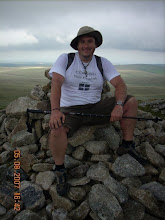


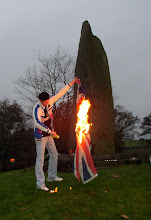












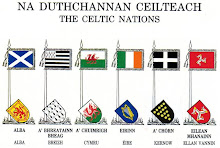.jpg)
















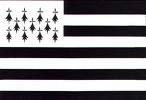






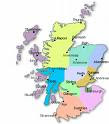














No comments:
Post a Comment